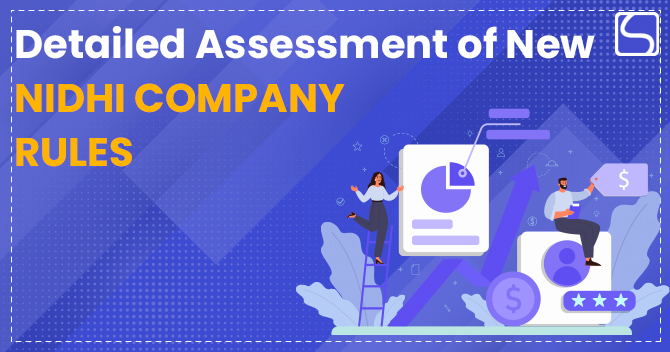Detailed Assessment of New Nidhi Company Rules

Ganesh Nair | Updated: Aug 02, 2022 | Category: Nidhi Company
Nidhi Company is a type of NBFC with the purpose of fostering the habit of savings and thrift amongst its members. These companies accept deposits from their members and lend them to each other for mutual benefits. The Nidhi companies need not obtain a license from RBI. However, they must be registered as a public corporation and have Nidhi limited in their name. The companies act of 1956 mentioned that Nidhi Companies needed a declaration from the central government to function. This declaration was not required under the Companies act 2013. Earlier, the Nidhi company needed to comply with – i) a minimum of 200 members, ii) Net owned Fund (NOF) of ₹10 lakh, keeping the NOF to deposit ratio a 1:20, iii) Nidhi needed to keep 10% deposits in the commercial bank/ post office within a year after 2014 rules. This blog shall provide a Detailed Assessment of New Nidhi Company Rules.
There were a lot of issues with the implementation of Nidhi companies under the company act 2013. Stakeholders believed that the 1956 Act provided a better framework for the Nidhi companies to operate, and the approval from the central government provided a structured way for these entities to operate. Keeping in mind these points, the Companies Act 2013 amended section 406[1]. And from the year 2019 central government’s approval was reinstated in the rules.
Between 2014-2019 around 10,000 entities applied to become a Nidhi Company. As per the data, roughly 2.300 companies made the required declaration in NDH-4 from. Many entities were found deliberately flouting the compliance norms. So to deal with this, the central government released the New Nidhi company rules-Amendment 2022. These rules will help introduce stability to the Nidhi companies.
Table of Contents
Nidhi (Amendment) Rules, 2022
The government introduced New Nidhi Company Rules with an amendment in 2022.
- Registration: Under the new Nidhi company rules, the government has tried to ease the process for an entity to get themselves registered as a Nidhi Company by letting the NDH4 be approved by them within the stipulated time period as stated in the rules.
- Mandatory Declarations: A Nidhi company must make the following declarations:
- A Nidhi company must ensure that they have a minimum of 200 members and a net-owned fund of at least ₹ 20 Lakh.
- The company must ensure that its promoters and directors meet the “fit and proper person” criteria per the rules.
- Commencement of the Nidhi Company: Nidhi Company must fill in form 20A and receive the NDH-4 approval to start its business. The company cannot function without obtaining the NDH-4.
- Central Government Approval: The government has the duty to approve NDH-4 within the span of 45 days after filing. If the applicant doesn’t receive any revert or approval, the NDH-4 will be presumed to be approved under the New Nidhi company rules.
- Nidhi companies formed after the amendments’ release do not require to file NDH-1 and NDH-2.
- Rules for Capital: The Nidhi Companies that existed before the amendment rules must ensure that they have a minimum capital of ₹10 Lakh; the government has allowed an additional 18 months for existing Nidhi companies to meet this requirement.
- Restrictions: Nidhi companies are barred from obtaining loans from any financial institution for the purpose of extending this loan to their members.
- Rules regarding the transfer of shares: A member is not permitted to transfer more than 50% of his shareholding on the date he chooses to avail a loan or make a deposit in the company as long as such a loan or deposit exists.
- Net-owned Funds: The New Nidhi Company rules state that an entity must have a Net Owned Fund of ₹ 20 Lakh. This requirement must be fulfilled within 120 days, i.e. four months of incorporation. For existing Nidhi companies, this period has been eased up; they have 18 months from the commencement of these rules to maintain their Net-owned fund.
- Dividends: The Nidhi Company are not permitted to declare dividends of more than 25% in a financial year.
- Opening of Regional Branches: In case Nidhi companies want to open their branch. They fill out an application using form NFH-2 and send it to the Regional Director within 30 days from the opening of the new branch. The company cannot open a branch outside the state in which it’s registered or is present.
- Shutting down of Nidhi company: In a situation where the Nidhi company needs to be shut down, The company must conduct a board meeting to approve this motion. Later they must apply form in NDH 2 to the regional director; this must be done as per the time limit set forth by the new rules. A Nidhi company must also publish this in a newspaper in the NDH-5 format.
- Permanent Closure of Regional branches: Any area in which a Nidhi company operates and this space is neither a registered office nor a branch, then it must be shut down within six months from the announcement of the new Amendment rules, 2022. Along with this, a notification must be sent to the registrar in form NDH-2 as per the New Nidhi company rules
- Inclusion of Silver: Silver shall be added alongside the word gold wherever applicable this means that Nidhi companies can lend out loans against silver articles.
- Withdrawal: In the event of an unexpected commitment, the Nidhi Company may be awarded a temporary withdrawal. However, for this prior approval from the regional director is necessary. This can be obtained by filing a request via NDH-2
Conclusion:
The New Nidhi Company Rules introduced by the government will be able to bring stability to the institutions. Since the switch of companies acts from 1956 to 2013, major loopholes have been created in the compliance procedure of Nidhi companies. To address these issues and prevent future non-compliance by such entities, the government has introduced the new Nidhi companies’ rules with the amendment of 2022.














